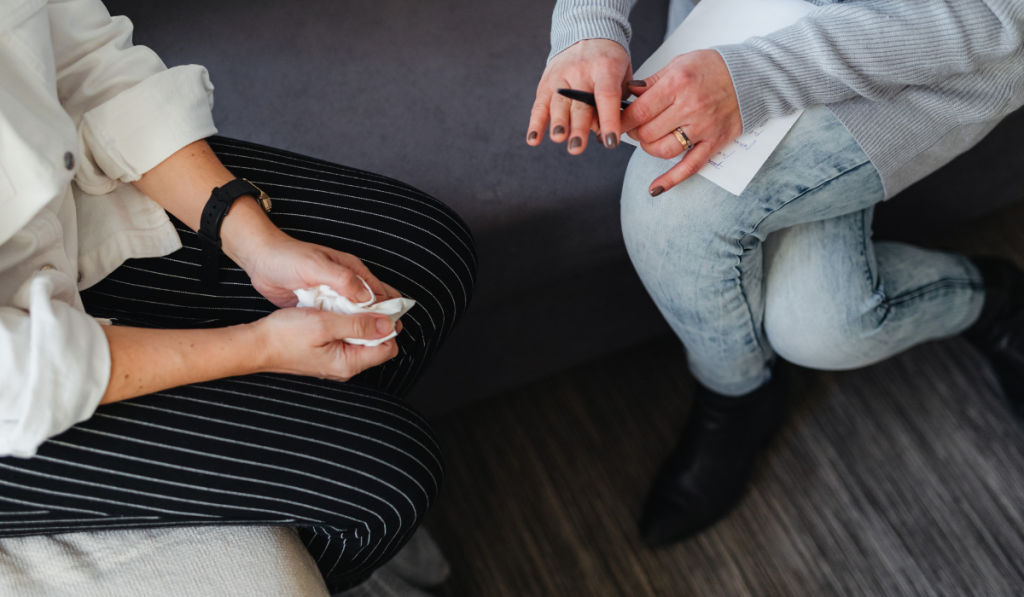
Understanding Experiential Therapy: A Hands-On Approach to Healing
October 21, 2025
Understanding the Serious Health Risks of Bulimia
November 4, 2025
Depression is one of the most common mental health disorders, affecting millions of people across all ages and backgrounds. While it can feel overwhelming, it’s important to know that effective treatment for depression is available—and recovery is possible. Modern mental health treatment offers a variety of approaches tailored to each individual’s needs, preferences, and life experiences. If you’re seeking therapy for depression, understanding the most common treatment modalities can help you have a more informed conversation with your therapist and take an active role in your depression recovery.
Below are some of the most effective and widely used forms of therapy for depression.
1. Cognitive Behavioral Therapy (CBT)
Cognitive Behavioral Therapy (CBT) is one of the most researched and effective treatments for depression. CBT focuses on identifying and changing negative thought patterns and behaviors that contribute to feelings of sadness, hopelessness, or guilt.
During CBT sessions, a therapist helps clients recognize distorted thinking—such as catastrophizing or self-blame—and teaches them to replace these thoughts with more balanced, realistic ones. The behavioral component involves setting achievable goals and practicing healthy coping strategies in daily life.
CBT is typically a short-term and structured approach, making it a practical choice for many individuals. Studies show that CBT not only helps reduce symptoms but can also decrease the likelihood of relapse after treatment ends.
2. Interpersonal Therapy (IPT)
Interpersonal Therapy (IPT) focuses on the link between relationships and mood. Depression often affects—and is affected by—our interactions with others. IPT helps individuals explore interpersonal challenges such as grief, role transitions (like job loss or divorce), or unresolved conflicts.
The goal of IPT is to enhance communication skills, foster social support, and enhance relationship dynamics. By resolving relational stressors and developing healthier ways to connect with others, clients often find that their depressive symptoms lessen. IPT is particularly effective for those whose depression is triggered or worsened by relationship difficulties.
3. Dialectical Behavior Therapy (DBT)
Originally developed to treat borderline personality disorder, Dialectical Behavior Therapy (DBT) has proven effective for treating depression, especially when emotional dysregulation is a major factor. DBT combines cognitive-behavioral techniques with mindfulness practices to help individuals manage overwhelming emotions and tolerate distress without resorting to harmful behaviors.
DBT typically includes four main components: mindfulness, emotional regulation, distress tolerance, and interpersonal effectiveness. Clients learn skills to stay present, handle conflict constructively, and develop self-compassion. DBT can be particularly useful for individuals experiencing depression alongside self-harm tendencies, mood swings, or trauma-related symptoms.
4. Psychodynamic Therapy
Psychodynamic Therapy explores how unconscious thoughts, early life experiences, and unresolved conflicts influence current emotions and behaviors. Unlike CBT or IPT, psychodynamic therapy is often less structured and more exploratory.
The therapist helps the client uncover patterns—such as dependence, avoidance, or perfectionism—that may contribute to depression. By bringing these unconscious dynamics to light, clients can gain insight into the root causes of their symptoms and begin to make lasting emotional changes.
While this approach can take longer, many people find it deeply transformative, especially for long-standing or recurrent depression.
5. Acceptance and Commitment Therapy (ACT)
Acceptance and Commitment Therapy (ACT) is a mindfulness-based approach that encourages individuals to accept rather than fight painful emotions. Instead of trying to eliminate sadness or anxiety, ACT teaches people to view these feelings as part of the human experience and focus on living in accordance with their values.
ACT combines mindfulness, acceptance strategies, and behavioral commitment to help individuals build a richer, more meaningful life—even when depressive symptoms persist. This therapy for depression can be empowering, helping clients break the cycle of avoidance and build psychological flexibility.
6. Behavioral Activation (BA)
Behavioral Activation (BA) is based on a simple yet powerful idea: changing behavior can change mood. Depression often leads to withdrawal, inactivity, and loss of interest in previously enjoyable activities, which reinforces feelings of hopelessness.
In BA, clients and therapists work together to identify activities that bring a sense of accomplishment or pleasure and then create a structured plan to reintroduce them into daily life. Over time, these positive experiences help counteract depressive inertia and improve overall well-being.
Behavioral Activation can be used alone or in conjunction with other modalities, such as CBT, and has been shown to be especially helpful for individuals struggling with motivation.
7. Mindfulness-Based Cognitive Therapy (MBCT)
Mindfulness-Based Cognitive Therapy (MBCT) blends traditional cognitive therapy techniques with mindfulness meditation. The goal is to help individuals become more aware of their thoughts and feelings without getting caught up in them.
MBCT is particularly effective for preventing relapse in individuals with recurrent depression. Through meditation and mindfulness practices, clients learn to observe their thoughts nonjudgmentally and recognize when old depressive patterns are resurfacing. This increased awareness can reduce emotional reactivity and promote long-term depression recovery.
Other Effective Treatments
While these seven modalities are among the most common, there are additional options for treatment for depression, such as:
Eye Movement Desensitization and Reprocessing (EMDR) for trauma-related depression
Transcranial Magnetic Stimulation (TMS) and Electroconvulsive Therapy (ECT) for severe, treatment-resistant cases
Medication management, often in combination with therapy, for balancing brain chemistry and enhancing mood stability
The right approach often depends on the individual’s symptoms, preferences, and medical history.
Finding the Right Path to Depression Recovery
Depression is highly treatable, and the first step toward recovery is seeking professional help. A licensed therapist or mental health provider can help you explore these modalities and determine which approach—or combination of approaches—best fits your needs.
No two experiences with depression are the same, and neither is the path to healing. With the right mental health treatment, ongoing support, and a commitment to the process, lasting depression recovery is entirely possible.
_________________________________________________________________________________
Looking for treatment for an eating disorder, anxiety, depression, trauma, or postpartum mood disorder?
Evolve Counseling Services is a specialized team of Licensed Therapists providing treatment in Paoli.



